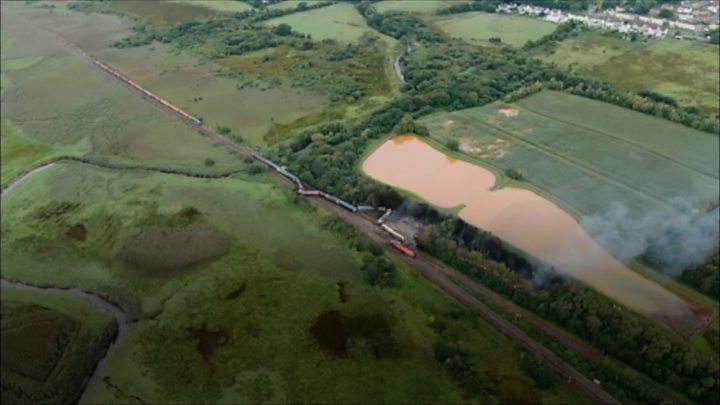Llangennech train fire: Up to 1,000 tonnes of oil in derailed wagons

There are fears for wildlife after a train carrying up to 1,000 tonnes of diesel derailed, causing an oil spill at scientifically important site.
The freight train derailed and caught fire in Llangennech, Carmarthenshire, on Wednesday night.
Ten wagons, containing up to 100 tonnes of diesel or gas oil, derailed, with oil spilling into the Loughor Estuary.
Natural Resources Wales (NRW) was not able to investigate the impact until the fire was put out.
The site of special scientific interest is home to wildfowl and wading birds. NRW has already said the derailment had caused oil to enter the nearby river Loughor.
On Friday, the Rail Accident Investigation Branch, which is examining the cause of the incident, said 10 wagons had derailed.In a statement it said the derailment and damage to the wagons had "resulted in a significant spillage of fuel and a major fire".
At the time of the incident, the freight trai, was carrying 25 tank wagons, each containing up to 100 tonnes of diesel or gas oil, ten of which derailed.
Aneurin Cox, from NRW, said on Thursday that it was "not safe" for workers to get close enough to contain the spill while the fire was still burning.
Mid and West Wales Fire and Rescue Service finally extinguished the blaze at about 08:30 BST on Friday, just over 33 hours after the train derailed.
'It could have a devastating impact'
The Loughor Estuary is part of the Carmarthen Bay and Estuaries Special Area of Conservation.
Richard Pryce, from the Llanelli Naturalists group, said the diesel spill could have a "devastating impact" on the local environment.
He said: "The Loughor Estuary is a very important site for its birdlife. It's a European protection site, a special area of conservation, which means its of European significance because of the large populations of wildfowl and waders.
"If there's oil spilling into the estuary it could have a devastating effect on the birdlife there.
"Diesel is very toxic to the environment so wherever it's spilt, it can be a big problem."
The area is also a significant site for cockle pickers.
Robert Griffiths, from the Burry Inlet Handgatherers Association, told BBC Radio Wales Breakfast the diesel spill will have a big impact on him and other cockle pickers financially.
He said: "If you don't work, you can't earn any money to pay your mortgages and your bills etc."
What happened?
The train was travelling from Milford Haven in Pembrokeshire to Theale, near Reading, when it derailed at 23:20 on Wednesday night.
The subsequent fire led to 300 people in the area surrounding the crash site being evacuated from their homes, before being allowed to return on Thursday.
The two crew members on board the train were not injured.
The Rail Accident Investigation Branch (RAIB) said it was carrying out a preliminary examination and gathering evidence.
Why is the Loughor Estuary important?
- The River Loughor's estuary, along with the Burry Inlet to the west, is designated as a site of special scientific interest
- Its habitat of tidal mudflats, saltmarsh - the largest continuous area in Wales - and rockpools offer important wildlife habitat
- Species of wading birds and wildfowl include oystercatcher, curlew, lapwing, little egret, widgeon, dunlin, plover and teal
- The estuary is known for its fishing grounds, for the likes of flounder, bass and mullet
- Further west, the Burry Inlet's cockle beds are well known, with the industry the third largest in Britain
- In that same area is the WWT Llanelli wetland centre, a popular place for spotting wading birds and wildfowl and the 450 acres of grounds.